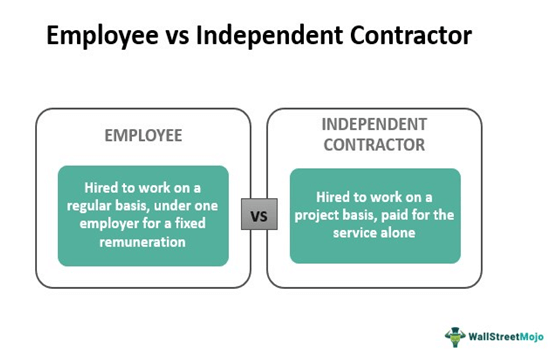Reducing Exploitation in the Gig Economy
By Philip Mattera, director of the Corporate Research Project for the Dirt Diggers Digest
On October 10 the San Diego City Attorney announced that
the grocery delivery service Instacart had agreed to pay $46.5 million to
settle a lawsuit alleging that it violated California’s labor code by
misclassifying some 308,000 of its workers over a five-year period.
Source: Independent Contractor vs Employee
(wallstreetmojo.com)
The following day, the U.S. Department of Labor announced a
proposed new rule for determining when gig workers should be classified as
employees rather than independent contractors.
These events represent two fronts in the widening war
between regulators seeking to bring traditional workplace protections to the
gig economy and companies such as Instacart that have come to rely on low-cost
flexible labor.
In the middle are the workers themselves, who do not
line up neatly on either side. Some of those doing gig work value flexibility
over things such as overtime pay and may view the DOL proposal and the stricter
rules adopted by states such as California as threats to their livelihood.
Yet there are also large numbers of people toiling for
the likes of Instacart and Uber who struggle to make a decent living and feel
exploited. Many of them would welcome the benefits that come with employee
status, even if it means more rigidity in their working arrangement.
The proposed DOL rule seeks to better identify who belongs in which category by replacing the narrow criteria adopted during the Trump Administration with a multi-factor test that it takes the department 184 pages to detail. For example, the DOL would look at whether the worker had the ability to set prices for the services provided.
These additional tests would likely make it more
difficult for companies to classify workers as independent contractors. Yet
even if the new rule is implemented in some form, the gig giants will resist
changing their ways. In all likelihood, they will go on treating workers as
independent contractors and wait to be challenged. That’s the approach they
have taken under current law
As shown in Violation Tracker, four of the largest
ride-sharing and delivery services have together paid over $88 million in
class-action wage and hour lawsuits. Uber leads
the pack with $49 million in such settlements, followed by Lyft with
$28 million. Instacart and DoorDash have
each paid about $5 million.
That is on top of what they have paid to state and
local agencies in misclassification cases such as the one brought in San Diego.
Uber, for example, recently paid $100 million to
New Jersey.
If the rules are changed, these settlements will
become even larger and more frequent. The gig companies will go on paying them
in the hope of staving off something they see as much worse.
Once gig workers become employees, it will be a lot
easier for them to seek the additional protections that come with collective
bargaining. Employee status is an important stepping stone to unionization,
which would mean an end to the worst forms of exploitation.
It is possible to imagine an economy that combines
labor flexibility with strong worker protections, but it would require the gig
employers to cede some of the one-sided control they now exercise.